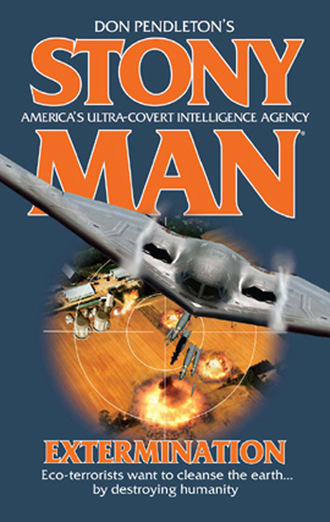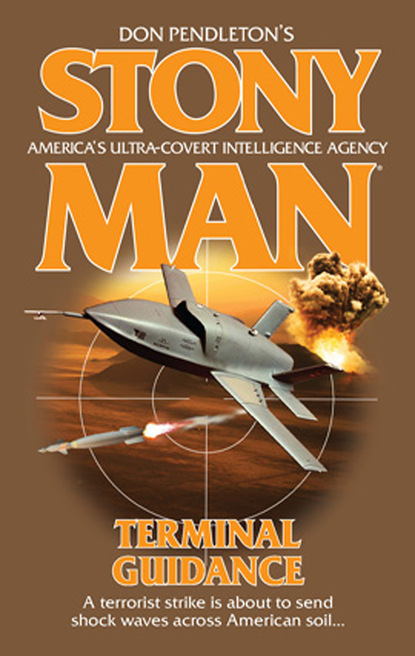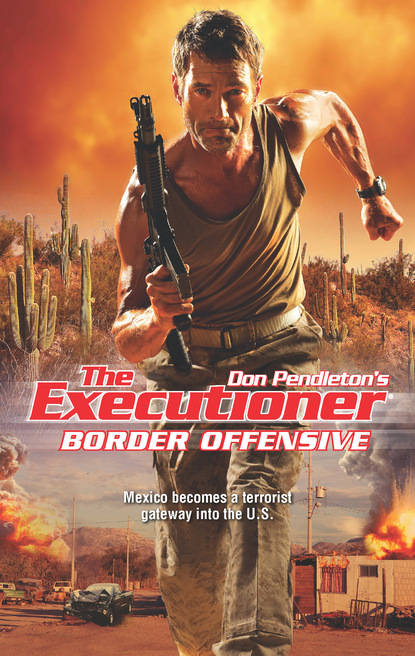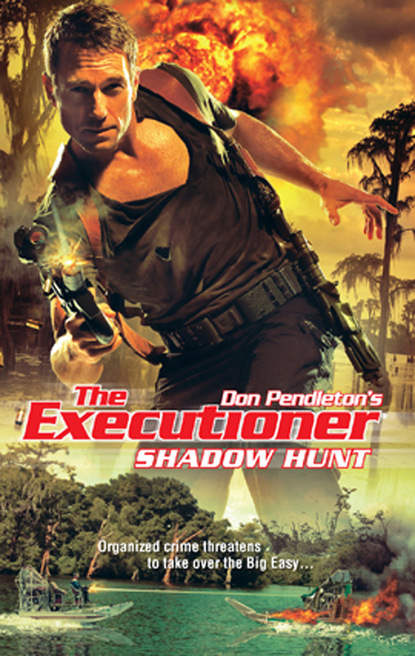
Полная версия
Extermination
One of the men in the lead truck poked his head and weapon out of the window. This guy had a submachine gun, as well, and he’d noticed Hawkins’s quick peek at the clogged road. Hawkins couldn’t make out what the gunner was packing, but it sure as hell wasn’t a folded newspaper and a cup of coffee. The roar of autofire filled the air as the doorjamb suddenly came alive with bullet impacts. Hawkins held his ground, enduring splinters of brick and old paint peppering his exposed face.
Whatever they were carrying, it was only a 9 mm, and for that he was grateful. Still, just because it couldn’t penetrate into his cubbyhole didn’t mean that Hawkins was free and clear to ignore the incoming fire. Once the barrage let up, Hawkins ducked low, rolled into the middle of the narrow road and opened up on a spot just above the SUV’s headlights.
The sleek, hypervelocity rounds from Hawkins’s PDW went to where he couldn’t see them above the glare of the lamps, but the clatter of a machine pistol on cobblestones rewarded the American Phoenix pro. He pumped out two more bursts, sweeping the headlights and blowing them out so that his night vision could recover from their bright flare. The engine snarled to life, and he could hear the vehicle jolt into gear.
Hawkins knew that the enemy was going to try to ram a half ton of truck down his throat, so he leveled the muzzle at the driver and cut loose. The last half of the P-90’s 50-round magazine elicited the crash and shatter of armored Plexiglas, but after a brief surge, the SUV no longer had pressure on the gas. The truck was idling forward, but its driver was dead.
Of course, that didn’t mean anything to the trailing SUVs. The gunners for each had clambered out behind partially open armored doors, scanning for Hawkins in the darkened street. Without the blaze of the headlights, he was just a shadow, flat on the ground.
That wouldn’t last for long, though.
He reloaded the machine pistol swiftly, all the while scrambling toward the idling, driverless SUV, keeping in the shadows from where the other vehicles’ lamps blazed down the narrow road. Hawkins rested against the bumper.
“Gary, leave anything for me?” Hawkins asked, knowing that such a question was moot when it came to the Canadian sniper.
TO MAINTAIN a low profile on this operation, the members of Phoenix Force opted for a set of tools that would help them look as if they were French special operations. This meant that their gear was typical police or military equipment. It allowed them use of familiar gear such as the PAMAS G1—a license-built Beretta 92-F—the FN P-90 and the suppressed rifle Gary Manning was currently riding, a PGM Ultima Ratio “Integral Silencieux” rifle in 7.62 x 51 mm NATO.
The Commando was a shortened version designed especially for urban operations teams. It was affixed with a 15.7-inch, integrally silenced barrel as opposed to the standard 24-inch tube, meaning that inside a crowded city, the Commando was handy and quick. Manning liked the name Ultima Ratio because it was Latin for “the last resort,” a term that went with Phoenix Force hand-in-hand, and it was derived from the original term ultima ratio regum, which was “the final argument of kings.” Since Phoenix Force had adapted their code names to variants of “king” and the phrase was a flowery synonym for “war”, Manning felt it was tailor-made for his cover identity of Gary Roy.
As soon as T. J. Hawkins started to take fire from the three SUVs in the street, he swung the muzzle of the suppressed Commando toward the convoy. Only one gunner was actively shooting, and as soon as he stopped his fusillade, Hawkins was in action. Through the optics of the rifle, he could see the muzzle-flashes of the P-90 through the end of its blunt silencer.
The headlights went out and the SUV lurched into action, but more autofire erupted from Hawkins’s position. Manning turned his attention to the other vehicles and saw that their gunners who had waited outside on security for the Syrian assault force were now looking for the source of the sudden, fierce combat that had erupted in front of them. The two gunmen were wary, but their attention was focused ahead of them, not behind and above.
Manning had complete surprise against them as he milked the precision trigger of the skeletonized combat sniper. The rubber recoil pad and suppressor made the lightweight weapon’s kick feel like a tender caress against his brawny shoulder as he punched a hole through the neck of one of the Syrians. The rearmost man’s death was instantaneous, spine severed and lower brain destroyed. He didn’t even shudder, falling to the ground as if he were a marionette with its strings cut.
Only the chatter of metal on cobblestones alerted the second gunman, who whirled to see his friend lying facedown in a sprawl of loose limbs.
Manning worked the bolt on the Ultima Ratio swiftly, the finely polished steel gliding noiselessly as it stripped another .308 Winchester subsonic round off the top of the 10-round box magazine. The time between the first and second shots, which struck the remaining Syrian gunner in the bridge of his nose, was less than a second. The noise made by the subsequent rifle shot was softer than a polite cough, but on the receiving end, the armed commando’s head burst like a melon.
“Gary, leave anything for me?” Hawkins asked.
“Get the middle SUV,” Manning instructed as the rearmost vehicle ground into Reverse. He didn’t have a good angle to see the driver of the truck, but Manning knew that a frightened driver would be a threat, not only communicating to the main assault team that they were under fire, but also tearing through the streets of Paris to escape pursuit. People could be run over.
Manning worked the rifle’s action as fast as he could, firing round after round into the roof of the SUV, adjusting his aim so that his fire would lance down into the driver’s seat. On his fourth shot, the escaping vehicle slammed its rear bumper into a storefront, glass shattering violently, metal crumpling as it met unyielding stone.
Hawkins ripped into the remaining Syrian escape car, his P-90 hammering at 800 rounds per minute, turning its windshield into a gaping hole and the driver into a mushy figure that resembled a deflating humanoid balloon.
“I hope to hell no one heard that crash,” Hawkins said.
“With David and the rest inside, I doubt they’d hear the sky crashing around them,” Manning answered.
RAFAEL ENCIZO WINCED, leaning back from the sudden slash of shotgun shells vomiting swarms of pellets like hungry, flesh-eating hornets. Bezoar’s defenders had carefully chosen their place to make their stand, and with a stubby set of 12-gauge scatterguns, they were able to dominate the row of windows where Encizo saw an additional team of Syrians collapsed. Only one of the Damascus assault squad was still alive, but his cheek had been torn off his face, one eye leaking down into the gaping flesh.
The Syrian saw Encizo and reached for his sidearm, his main weapon lost in the initial conflagration that left him facially mutilated. The Cuban was not a man to take chances, but he couldn’t bring himself to gun down a man, especially at such close quarters, and when he’d received terrible injuries already. With a kick, he disarmed the man and leaned his weight into the Syrian’s chest.
“I’m not here to kill you,” Encizo stated, pressing his forearm against the man’s throat. “In fact, we’re probably both here after the same man. Bezoar.”
With lacerations down the right side of his face, the Syrian’s grimace was hideous. “That…animal. He’s out of…control.”
Encizo could tell the genuine rage underneath the other man’s words. “Where else are you hurt?”
The man tugged open his shirt, looking down at the glimmering copper discs embedded in dark blue nylon beneath. “Armor stopped the bullets.”
Encizo let go of the man’s arm and loosened his forearm from the Syrian’s throat. “We’re on the same side.”
“Gunfire dropped off drastically,” the agent said.
“I’m not sure that’s a good thing,” Encizo said. He handed over a small, prepacked wound dressing kit. The maimed Syrian wasted no time, stuffing his pistol back into its holster and pressing a pad of gauze firmly against his torn socket. He’d never be able to save the eye. The best he could hope for was to keep out infection and prevent losing more blood. Micropore cloth tape held the dressing in place, especially one long strip wound three times around his head.
He’d live, but he didn’t look strong enough to get back on his feet. He’d been rattled too hard by the blast that had laid open his face. However, there was one chance that Encizo could take by recruiting the man as a friendly intelligence asset. The Syrians and Phoenix Force had clashed on several occasions, but this wouldn’t be the first time that the five-man team would work alongside traditional national enemies, especially in the face of a full-on crisis.
Whatever had caused Bezoar to become so instantly important to warrant not one but two attempts by the Syrian commando team, as well as garner the interest of Western intelligence, must have been big enough for Encizo not to regret the decision to rescue and aid a foe.
The Syrian commando took a fist full of Encizo’s sleeve. “He’s gone rogue.”
“You told me,” the Cuban replied.
“You don’t know how bad it is,” the injured man urged. “This is worse than anything your side could imagine. Even we didn’t want it to exist.”
“Exist?” Encizo asked.
“When Bezoar showed his test, it was too terrible,” the one-eyed commando continued. “It’s a deadly enzyme…some kind of infectious protein.”
“We figured as much,” Encizo returned. He didn’t want to betray his knowledge of one of Bezoar’s prior experiments, just in case the Syrians had a long enough memory to remember the destruction of a project that would otherwise have created a harvest hell throughout the Mediterranean.
“He improved on it,” the Syrian told him. “But we missed.”
“So you went after him again,” Encizo answered. He kept his attention only peripherally on the wounded man; his main job was to provide security for the back door.
“No, we missed now!” the Syrian hissed. “He’s gone.”
Encizo looked down at the wounded man.
“This was a trap, and both of our teams walked right into it,” the injured man croaked weakly.
Encizo felt his stomach twist at the news. “David, can you read me?”
No answer over the radio, nothing but a blanket of static that knocked out the radio network he was plugged into.
“David!” Encizo bellowed, hoping that his old friend could hear him.
Gunfire rose to a crescendo once more in a far part of the building.
DAVID MCCARTER GRIMACED as he realized that the tactical network that tied him to the rest of the team had gone silent. He waved to Calvin James, and the former SEAL nodded, acknowledging that his radio was out of commission, as well.
“We’re in for a rough one,” McCarter muttered as the gunfire suddenly died out. “Or maybe not…”
“One side’s run out of targets,” James commented. “We’re never lucky enough for both sides to finish each other off.”
“There’s always a first time,” McCarter mused.
“Yeah, right. I don’t see you running out willy-nilly,” James returned.
The Phoenix leader nodded, but he still took the lead as he moved toward the stairs. The old apartment building was pre-elevator technology, so its center was a spiral staircase decorated with black wrought iron that twisted from the ground to the upper floors. McCarter’s ears were peeled for the sound of movement above, and he checked the steps. They were made of stone, so they wouldn’t bend and creak like wooden slat stairs, meaning that they simply had to keep their footsteps soft and careful.
He moved up with catlike grace, James following several steps behind, preventing the pair from bunching up to be caught in the same burst or pattern of buckshot. McCarter, in the lead, knew he’d get most of the enemy attention, but despite his earlier assessment of how he’d matured in terms of no longer being impatient and addicted to action, he still was a man who led from the front, taking even more risks than those he assigned his own men. He had no illusions that he was bulletproof or immortal, but he knew his skills, equipment and reflexes. McCarter wasn’t the kind of man to boast, yet he knew his odds of surviving a close combat situation were among the best of anyone on the planet.
Calvin James hung back for another reason: he’d supplemented his P-90 subgun with a sawed-off shotgun with a dull orange stock. The coloration wasn’t a matter of fashion, but rather a means of telling this particular weapon from a live, fully-lethal 12-gauge. The orange-stocked weapon had a tube magazine, and its threaded sling was loaded with less-lethal munitions, specifically designed for the purpose of rendering opponents incapable of fighting while still leaving them available for subsequent questioning. Less lethal was not a guarantee, and if James had to kill in his defense, he’d be able to end a foe’s existence with a direct hit to the face. Still, the majority of the loads were high-intensity neoprene slugs, flexible enough to yield when they struck flesh without penetration, but possessing all the horsepower of a regular slug. James had taken hits to the chest with one as part of his familiarization with the round’s effects, and even through body armor, his chest was blackened with bruises.
Right now, however, the first three rounds were “ferrets,” or compact capsicum suspension dispersal shells that could punch through a windshield or a door and vomit out several dozen cubic feet of tear gas. Capsicum was another effective tool in taking foes off guard, denying them their sight and smell, as well as limiting their ability to speak as their mucus membranes inflamed at the touch of the raw, powerful pepper extract. Bezoar needed to be taken down, and it would be beneficial to Stony Man to figure out who had spirited the mad scientist out of Syria and into Europe.
“Let ’em have it,” McCarter said in a stage whisper to James, and the Phoenix Force medic brought up the stubby shotgun, working the slide and trigger of the weapon as fast as he could, spearing the trio of ferret rounds toward the fourth and top floor of the building. Thick, cottony white smoke roiled from their points of impact, immediately followed by a fit of coughing and wheezing.
A figure stumbled into the open, his head wrapped in dark cloth, a machine pistol locked in both of his fists. McCarter reacted to the man’s sudden appearance with well-honed, lightning-fast reflexes. A snarl of 5.8 mm rounds tore into the gunman just before the tear-gas-resistant foe could pull the trigger. While the FN P-90 didn’t throw fat or heavy slugs, its lightweight projectiles moved at 850 meters per second and carried 540 joules per bullet. When McCarter opened up at 800 rounds per minute, ripping five shots into the gunman, ribs shattered and flesh parted as the high-velocity projectiles created havoc. With his lungs and aorta reduced to ribbons of slashed tissue, the only thing that the would-be killer was able to do was to tumble headfirst over the railing.
McCarter hoped that the hardman was instantly dead; otherwise the crushing impacts against the rails of the spiral staircase would have been additionally agonizing, limbs folded with ugly crunches as his mass and velocity vectors proved far too much for his skeleton to withstand. Forty feet down, Bezoar’s hired gun stopped violently, his corpse accordioning against the floor, spine compressing, discs sliding off to the side from each other in their effort to accept gravity’s loving embrace.
“It’s not the fall—it’s the sudden stop,” McCarter mused to himself.
Other defenders had donned some manner of clothing to shield their nostrils and eyes from the brutal effects of the tear gas, but none had been so quick and efficient as to be able to charge out with their guns ready to blaze like their recently departed comrade.
As he took the steps three at a time, McCarter bounded to finish this encounter with the enemy shooters before the Parisian gendarmes arrived with a few heavily armed assault teams. While Phoenix Force proved that it was able to fight its way out of some of the most hostile environments in the world, getting into a direct conflict with lawmen only doing their job was something that the Stony Man warriors wanted to avoid at all costs. Shooting a soldier on the same side was a moral choice that each had taken. While that moral choice was made flexible in dealing with corrupt and crooked lawmen or troops, the French counterterrorism police were allies in the same cause.
With that in mind, McCarter let the P-90 drop to the end of its sling, withdrawing a collapsible ASP baton. He flicked his wrist, and the high-tensile steel tubes telescoped to their full length with an ominous snap. The sound caught the attention of one of the masked thugs, and he turned, drawing up his Steyr TMP machine pistol to deal with the sudden attack. McCarter batted aside the enemy gunman’s barrel with one swipe of the locked baton, using the rebound off the gun’s polymer frame to guide his next strike, a jaw-shattering stroke that whipped the cloth from his face.
McCarter could see that the enemy had East Asian features in the brief flutter of freed-up cloth, but he kicked the stunned or unconscious foe out of the way, whipping the point of the ASP down on the juncture between another gunman’s neck and shoulder. Nerves overloaded under the assault, bringing a wail of pain from his target. A third gunner with a pistol was bowled over by a neoprene slug from James’s shotgun, the three-quarter-inch cylinder of hard rubber breaking bones as the Phoenix medic hit the man right in the sternum.
James didn’t wait to see if his target would stay down because the pistol hadn’t fallen from nerveless fingers. The less-lethal shotgun proved quite deadly as James put another rubber baton round into the defender’s face, blood squirting from his eye sockets.
McCarter had no time to comment on the gruesome demise as he was dealing with the fourth enemy soldier, lashing this one under his arm to make him drop his firearm. Instead of bringing the ASP around to administer a coup de grâce, the Briton jammed the heel of his palm under his opponent’s chin, whipping his head back violently. The last of the defenders in this doorway were littering the walkway, their battered forms providing grim testimony to the efficiency of Phoenix Force.
McCarter let the baton drop to the floor, swinging his P-90 back into his grasp.
Lifeless bodies were strewed around the room, only one man still sitting upright. His white shirt was a bloody mess, and while at first blush he would have resembled Bezoar, a mouth full of mangled and busted false teeth yawned from the gaping gash of his lips. Bezoar’s file read that he had perfect teeth and no dental work done to improve them.
This guy was a fake, and he was holding on to an unmistakable D-shaped object.
A dead man’s switch equipped with a trigger that its wielder held down. Upon death and the relaxation of his fingers, whatever charge it was connected to would detonate.
The bloody, cap-filled smile broadened with the sight of McCarter and James. “And so…Paris dies.”
A second later he was a corpse, head flopping forward, the dead man’s switch tumbling to the cold tile floor….
Конец ознакомительного фрагмента.
Текст предоставлен ООО «ЛитРес».
Прочитайте эту книгу целиком, купив полную легальную версию на ЛитРес.
Безопасно оплатить книгу можно банковской картой Visa, MasterCard, Maestro, со счета мобильного телефона, с платежного терминала, в салоне МТС или Связной, через PayPal, WebMoney, Яндекс.Деньги, QIWI Кошелек, бонусными картами или другим удобным Вам способом.












